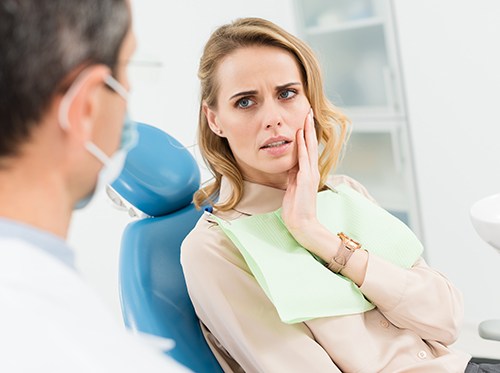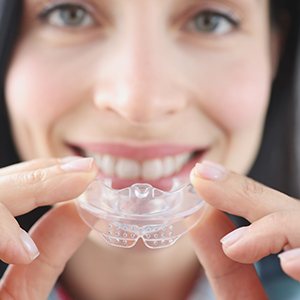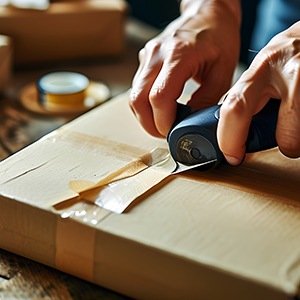Emergency Dentist Delray Beach
We’ll Be There For Your Smile When You Need Us

At Delray Beach Smile Design, we’re big on flexibility. In today’s world, the stress of work, parenting, and trying your best to keep up with your oral health can be a struggle. Because of this, we also understand that accidents happen. That’s why we’re happy toer flexible same-day, after-hours, and weekend emergency dental appointments. If you find yourself dealing with the unexpected, give us a call or Book Online so your emergency dentist in Delray Beach can help.
Why Choose Delray Beach Smile Design for Emergency Dentistry?
- Very Flexible Dental Appointment Times
- Same-Day Emergency Visits
- Dentalice Open 7 Days a Week
How We Treat Dental Emergencies

- Give Us a Call: The first step you should always take if you experience oral pain or out-of-the-ordinary symptoms is to call our team right away. We can provide you with first aid guidance and schedule an appointment for you as soon as possible, including on the weekends or after-hours.
- Get Examined: We’ll start by capturing any necessary diagnostic images, like X-rays, and Dr. Dadaciu will complete a thorough examination of your teeth and gums. Using the information we’ve gathered, Dr. Dadaciu will diagnose the issue at hand and develop a treatment plan that she’ll walk you through.
- Undergo Treatment: Once you consent to move forward with treatment, our team will get to work. In some cases, we may be able to do everything you need in one appointment.
The Most Common Dental Emergencies
Wondering whether your symptoms are signs of a dental emergency in Delray Beach? You can view some of the most common urgent issues that we see below. If you’re still unsure about whether or not your situation requires immediate attention, we highly encourage you to call ourice.
How to Prevent Dental Emergencies

Dental emergencies can happen at any time, and sometimes it’s not possible to prevent them. But often, there are things you can do to lower your risk of them occurring. Whether it’s through proper oral hygiene, stopping bad habits, or even by watching what you eat, taking excellent care of your teeth and gums can help keep them safe and healthy, mitigating your risk of unexpected damage or pain. Here are a few ways you can reduce your risk of an urgent dental problem occurring.
Visit Your Dentist Regularly

Visiting Dr. Dadaciu regularly is one of the best ways to reduce your risk of a dental emergency. With regular, biannual dental exams and cleanings, she can closely monitor your oral health and possibly prevent an emergency from occurring. She can also treat any issues that arise before they become urgent, saving you time, money, and potentially a lot of discomfort.
Maintain Good Oral Hygiene Habits at Home

In addition to regular dental care, maintaining your oral hygiene at home is the best way to ensure that your teeth and gums stay healthy and emergency-free. Be sure to brush your teeth twice a day, and floss once daily. Should you notice any changes or sensitivity in your teeth and gums, call Delray Beach Smile Design as soon as possible for an appointment.
Be Careful with Your Diet

Diets that are high in sugar and carbohydrates can be a haven for cavity-causing bacteria. Thus, eating foods that are high in vitamins and minerals can help lower your risk of tooth decay. Furthermore, eating foods that aren’t excessively crunchy like hard candy and ice can also help maintain the structural integrity of your teeth.
Wear a Mouthguard

If you play sports or grind your teeth, speak to Dr. Dadaciu about a custom mouthguard. These orthotic devices help protect your teeth from things like sports injuries and pressure fractures or excessive wear from grinding (bruxism). Best of all, because they are custom fit to your mouth, they are much more comfortable than those over-the-counter boil and bite guards that you may be less likely to wear if they’re too bulky or uncomfortable.
Use Tools, Not Teeth to Open Packaging

Sure, it can be a lot faster to tear that packaging open with your teeth than it might be to locate a pair of scissors, but tooth enamel can become easily damaged if used for “off brand” purposes. Thus, never use your teeth for anything but chewing food. The extra time it takes to locate a proper tool can ultimately save you time, money, and embarrassing tooth damage!
Dental Emergency FAQs
What Does Throbbing Tooth Pain Mean?
Severe throbbing tooth pain is likely a sign of inflammation or infection within the tooth. This may be caused by bacteria breaching the outer layers of the tooth and colonizing the pulp tissue within, but it is also sometimes the result of cracks in the enamel allowing air or germs to enter the tooth’s inner chamber. When the pulp becomes infected, the nerves it contains will send distress signals to the brain, resulting in pain. However, throbbing tooth pain may be a sign of teeth grinding or clenching, which can often be addressed by wearing a nightguard to bed.
Will a Toothache Go Away on Its Own?
If a throbbing toothache is caused by bacterial infection within the tooth, it will probably not go away on its own and may lead to severe consequences for your oral and overall health. For this reason, it’s a great idea to have a painful tooth checked at our office in Delray Beach just to make sure that nothing is wrong. However, your toothache may go away on its own if it is caused by irritation of the tissues supporting the tooth. You may also be able to get rid of tooth pain by using dental floss to remove a stubborn bit of debris from between your teeth.
How Should I Sleep with Tooth Pain?
A toothache may be much harder to ignore at night since there isn’t as much light and noise to draw your attention away from it. Thankfully, you may be able to reduce your tooth pain by applying a cold compress or taking over-the-counter pain medication. You may also find some relief by propping up your head with cushions or pillows when you lie down, as this can help reduce the blood pressure in the afflicted tooth. Clove oil is an ancient home remedy for toothache, so you may want to try applying it to a cotton ball and holding it over the pained tooth to reduce your discomfort.
Can I Pop a Dental Abscess on My Own?
Popping a dental abscess can expose the infected tissue to the air and the oral environment, so it’s imperative that you never attempt to pop one on your own. Instead, contact our office so we can schedule you for an emergency appointment and resolve the infection in a sound and sanitary manner. Neglecting to have a dental abscess treated by a professional may also lead to the infection spreading to other parts of the mouth and body such as the neck, throat, and head.
I Need a Checkup & Cleaning I am Worried About Gum Disease I Have a Cavity or Broken Tooth I am Missing One or More Teeth I Want to Enhance My Smile I Want a Straighter Smile View Our Services
